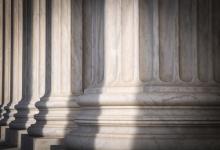Super PACs

To avoid conflict, it is suggested that friendly conversation omits three things: money, politics, and religion. However, it’s no secret that in current Washington discourse two of these things seem to be indefinitely intertwined. I’ll give you a hint — it’s not “money and religion.”
In the past decade, the intimate relationship between money and politics has infiltrated the public sphere at an alarming rate: corporations set public policy agenda items, super PACS have unlimited reign over campaign finance, and just 0.4 percent of the U.S. population is responsible for funding 63 percent of candidate campaigns, political parties, and PACs.
But what do money and politics have to do with religion? Patrick Carolan, Executive Director of Franciscan Action Network (FAN), explained last week to a group of faith leaders at Catholic University why faith, money, and politics are interconnected.

Yesterday, the Supreme Court struck down a law that limited the amount of money that an individual can contribute to political campaigns in a two-year election cycle, while upholding the limit that an individual can give to a single campaign in the same period. Previously, the law limited total individual contributions to all political campaigns to $48,600, while capping individual donations to a single campaign at $2,600.
The bottom line of yesterday's McCutcheon v. Federal Election Commission ruling is that there will be more money in politics, as the Court doubles down on the controversial 2010 Citizens United v. Federal Election Commission ruling that allowed unlimited, anonymous expenditures by outside groups on election activities. Those with resources can now contribute up to $2,600 in all 435 congressional districts, more than 30 Senate races, and the presidential election, while at the same time giving millions more to Super PACs in support of these candidates.
The ruling will give more influence to corporate and labor lobbyists whose groups contribute to political campaigns. It is still illegal to give a donation that explicitly requests a legislative action in return for the contribution. But while politicians spend hours every week making phone calls soliciting contributions, they aren’t likely to forget who is funding their political future. When they hang up the phone and meet a lobbyist in their office whose group is funding their campaign, there is an unspoken understanding that the politician will be more open to the idea that lobbyist is presenting.

Last week marked the fourth anniversary of the landmark Supreme Court case Citizens United v. Federal Election Commission. In a 5-4 ruling, the court ruled that corporations are entitled to the same free speech rights as individual humans as guaranteed under the First Amendment.
The political repercussions of Citizens United include the rise of “Super PACs” — political action committees that can raise and spend unlimited amounts of money, independent of direct campaign contributions, to influence politics. The power yielded to such corporations, as well as indiscriminate spending allowance, has deleterious effects upon our democracy.
Because money talks, big money will talk a lot louder, drowning out the voices of average Americans trying to exercise their own civic rights. Politicians are undoubtedly more apt to respond to the requests of companies that shelled out hundreds of millions of dollars on supportive campaign politics than to the needs of a college graduate or working family who donated 10 bucks. Doesn’t exactly smack of sound democratic governance.

Note from Jim Wallis: On October 25, Troy Jackson wrote this piece for God’s Politics. He called for a “media fast” on November 2 — today. I thought this was a compelling idea so I am putting it out there again. So Turn Down the Noise: Fast, Pray, and Vote — today or one of the days before the election. Read and heed.
I was a teenager when the rock and roll "documentary" Spinal Tap premiered. Like many in my generation, I love the scene when Spinal Tap member Nigel Tufnel (Christopher Guest) proudly shares with reporter documentarian Marty DiBergi (Rob Reiner) that the band's special amp has dials that go up to eleven:
"You're on ten here, all the way up, all the way up, all the way up, you're on ten on your guitar. Where can you go from there? ... Nowhere. Exactly. What we do is, if we need that extra push over the cliff, you know what we do?" Marty responds, "Put it up to eleven," and Nigel emphasizes the point: "Eleven. Exactly. One louder."
This election season, I have come to believe that Nigel was on to something. You see, here in Ohio we have seen political advertising go "one louder" and receive "that extra push over the cliff." The NOISE is so deafening, I'm convinced the campaigns and super PACs have discovered a way to turn the dial all the way up to 11!
LATE LAST YEAR, President Obama made a pilgrimage of sorts to the sleepy town of Osawatomie, Kansas, to talk about the economy. He went there because it’s where, in 1910, Teddy Roosevelt gave one of his most famous speeches, called “The New Nationalism,” which was, in part, an attempt to unite his party around a common vision of a well-managed economy.
Obama’s mission was similar, although more focused on philosophically framing up the 2012 elections. The White House communications staff had built up expectations about the speech, and the president delivered, movingly describing how America can better encourage innovation, shore up the middle class, and expand opportunity. For the most part, the media were aglow.
A few minutes in, he quoted from Roosevelt’s speech: “‘Our country,’” Obama said, “‘means nothing unless it means the triumph of a real democracy ... of an economic system under which each [person] shall be guaranteed the opportunity to show the best that there is in him [or her].’”
But, notice those ellipses. What he omitted was an important phrase from the original quote: “the triumph of popular government.” Five words may not seem like much. Perhaps the president felt as if “real democracy” said enough, or perhaps his speechwriters felt as if it wouldn’t be politically prudent for him to speak so highly of government. But the omission also points to a larger exclusion, not just in Obama’s speech, but in his presidency and, most significantly, in our country’s priorities.

It’s been several years since I’ve attended a National Prayer Breakfast, the annual event held Thursday morning in Washington, D.C., attended by the President, members of Congress, and guests — about 2,500 of them.
When I lived and worked in D.C. I attended almost every year. Senator Mark Hatfield, for whom I worked, was a faithful member of the Senate Prayer breakfast group which met weekly, and with the group in the House, sponsors the this national event.
My worry always has been that such a gathering merely sprinkles holy water on the nation’s powerful leaders without any real accountability to the prophetic message of the Gospel. As a breakfast speaker one year, Hatfield called for national repentance for arrogance and sin, referring especially to the Vietnam War. His comments broke with the normal rhetorical decorum of the event and angered President Nixon, but received widespread coverage and much respect.
These days, the early-morning prayer breakfast is also accompanied by countless luncheons, dinners, and seminars for people who come from around the nation and the world to attend. The idea behind the prayer breakfast movement is simple: Gather politicians and leaders together in a country (or state, or city) to pray with one another “in the Spirit of Jesus,” and hope that this dependence on God will transcend differences to build a movement grounded in love for one another and one’s neighbor. It’s supposed to be devoid of “politics.”